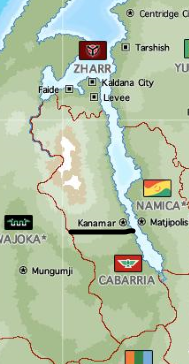Zharr
Greater Kaldana Territories | |
|---|---|
|
Flag | |
Motto: Y seht haatc puugc yc y cfunt haatc y fradcduha, ev ed ec du gaab edc atka (A mind needs books as a sword needs a whetstone, if it is to keep its edge) | |
Anthem:
| |
 | |
| Status | Frontier territory of Kaldana, Imperial Haruspex Colony |
| Capital | Kaldana City[1] |
| Largest Township | Kaldana City |
| Official languages | Haru-Dakat |
| Recognised national languages | Anglish |
| Recognised regional languages | Kel-Zha |
| Demonym(s) | Kaldanian |
| Government | Semi-Autonomous Colonial Autocracy |
• ArchDuke | Kizan Vek Elemmiire |
• High Lord | Yenck Grail Zun |
| Legislature | Advisory to the Duke |
| Colonial Service Ministry | |
| Citizenry Services Ministry | |
| Autonomous Province | |
• 2002 | In the aftermath of the Zharrian-Cabarrian war. |
• 2005 Contact lost with the mainland. | 2019 Contact reestablished with mainland. |
| Area | |
• Total | 279,900 km2 (108,100 sq mi) |
| Population | |
• 2021 census | 15,733,589 |
| Currency | Haru Credit[1] (HCr) |
This article is incomplete because it is pending further input from participants, or it is a work-in-progress by one author. Please comment on this article's talk page to share your input, comments and questions. Note: To contribute to this article, you may need to seek help from the author(s) of this page. |
Government
Government Type: Semi-Autonomous Colonial Autocracy
Ideological Stance: Neo-Epicurean
Head of State:
- Kizan Vek Elemmiire - ArchDuke, Highest Noble rank of the Greater Kaldana territories
Senior Advisor:
- Yenck Grail Zun - Advocate of the Archduke, High Lord of the Kaldanan Imperial Court
Colonial Service Ministry:
- Pav'Klin - Ministry of Transport
- Val'Chec - Ministry of Defense
- Yulis Vek Zun - First General of the Kal'Zhar Colonial Military High Command.
- Trast Ul'Zun - First Admiral of the Kal'Zhar Naval Command and Control
- Na'Gheman - Kal'Zhar Security Services (KZSS)
- Yasa Keric Zun - Ministry of Industrial Oversight
- Gor'Kvir - Social, Health and Population Services Ministry
Citizenry Services Ministry:
- Mari'Ghev - Environmental Services Ministry
- Fekri Hallas'Zun - Executive Officer, Kunya Trade Authority
- Svel Mzil Velven - Medical Technology and Research Services Ministry
- Nimaz Vek Zun - Food Services Ministry
- Elmar'Rov - Ministry of Foreign Trade Affairs
Government Information The government of the Greater Kaldana Territories is a borderline archduchy, where military and civil governance go hand in hand. Citizens are encouraged and even required to work for the government for a certain period of time, whether it be in the armed forces or in civil governance. The government of the colonial territories is widely accepting of all races, creeds, and ethnicities, though this attitude is born more out of a practical need than an altruistic one.
Much like the mainland where the original colonists are from, the Kaldana territories are divided into multiple city-state/regional commissariats that govern large swaths of the territories. These governing bodies act as smaller replicas of the imperial government that the original colonizers were familiar with and have provided the colonial territories the flexibility and capability to govern such a fairly sizable population between the current three city-states.
The Kaldana commissariats are separated by 2 different distinctions:
Executive power in the Kaldanan Imperial Court is held by the Colonial Service Ministry, a coalition of nobles of various government service and high ranking military leaders, each of whom also acts as the head of one of the government's departments. Acting as the head of the state and the Council is the Senior Advisor, a first among equals who has special powers that were created to allow the Council to act quicker and more decisively in times of emergency, as well as being the most trusted advisor to the current leader of the territories. Senior Advisors are elected for four-year terms, though this can be shortened or lengthened depending on extraneous circumstances.
The Citizenry Services Ministry, consisting of lower ranked nobles, military officers, merchants and so on, has not gone the route of the mainland version of being mostly ceremonial. This direct distinction allows the Citizenry Services Ministry power to create and modify laws. There are very few instances in the colonial history where the two sides have agreed unanimously without modification of a bill or edict.
While the mainland acts as a hereditary led autocracy, the colonial territory does change leaders every eight years.
Inner Colonial City-States
- Kaldana City
- Faide
- Levee
Frontier Colonial City-States
- Kanamar
- Vaska
- Maidenhead
Tiered Citizenship
Tiered citizenship structure follows the same as the mainland. As citizens become more effective and useful members of society, their citizenship tier can rise, granting them more rights and privileges. A popular punishment for minor crimes is the reduction of a citizenship tier, which can restrict their freedom of speech, freedom of movement, and countless other details of daily life that go as far down as the amount of water allotted to a citizen's showers each month. Frequently, such verdicts come paired with specific criteria for the reinstatement of a citizen's tier.
These Tier levels compare to contemporary economics/living standards as of current.
Despite the Haru penchant for authoritarian/autocracy of a sort, it’s still mostly a meritocracy. People will go up and down in tiers multiple times in their life. You’re not destined for poverty, but you’re not going to stay at a high level just because you’re born there.
Productivity earns your place in this system.
- 0: Dissident.
- 1-3: Varying degrees of criminal or incarceration tiers.
- 4-5: Basic income. But with universal healthcare and military conscription this is more than likely a place everyone’s been at some point. So there’s no shame in being here, only staying here. Non-skilled labor is in this category.
- 6-8: Lower middle class to middle class. Educated-skilled workers, clerks, military enlisted, and the like. Probably a good portion of the population.
- 9-11: Upper middle class. A level to aspire to, maybe two houses, a few luxuries. Tradesmen, craftsmen, educators, senior military enlisted, professionals.
- 12-13: Upper class. Small business owners, junior officers, junior politicians, bankers.
- 14-16: Court class. Nobles, senior military officers, politicians, corporate leaders, minor celebrities.
- 17-18: High class. Minor house lords, high ranking military, high ranking politicians, captains of industry, well known athletes and artisans.
- 19-20: Regent class. Major house lords, heads of major corporations, occasional war veteran military leader. Etc.
- 21-24: Royal class. These people are so few in numbers (across the entire imperium's territories) that they spend the resources to not be noticed. And arguing if someone’s on tier 21 or 25 is considered rude anyway. They have the financial power to control entire city-states, perhaps multiples of such and tend to self police themselves for the good of the nation. The common citizen may have heard of “the 21 Club” but probably couldn’t name a single member.
- 25: Imperial class. Generally speaking the leadership of the territories, they're associated family members named as possible successors should the House and bloodline they represent, be chosen to lead the nation. The lives of the Imperium are at their mercy and control, as are the choices of where to lead them.
Judicial branch
Tribunal of Atonement (Supreme authority of the Tribunal is appointed by the Archduke after designation by the council; all other officers of the Tribunal are appointed by the Citizenry Services Ministry council )
Laandstrad
Houses major and minor within the greater Kaldana domain. The colonial territories have much fewer houses, even with the upstart of Keric Zun.
Major Houses:
- Mzil Velven – Among the first to be deployed during the time of strife in Kabarria, did not expect the mainland to close communications. They remain a political and economic force within all the current city-states and are a major supporter of the frontier expansion.
- Vek Elemmiire – Most of the founding members from this house did not expect to be stranded in the early days of the colonial territories. While not as large as the Zun or the Velven, the Elemmiire still circulate throughout all the domain and frontier.
- Tagnik Zun – Were present during the time of strife and stranded because of it. Has since become a powerful house of the domain in every city and the frontier.
Minor Houses:
- Hallas Zun – Widespread splinter line, made the decision to aid refugees and was ordered to stay. Has a large Zharrian enlistment status.
- Hallas Elemmiire – Found a resurgence in being apart from the colonial territories.
- Hallas Velven – Rooted deep in the city-state of Levee.
- Renor Vlos – Rooted deep in the city-state of Faide.
- Keric Zun – A relatively new splinter line to the main Tagnik Zun. Has claimed Veska Township within the Zharrian Frontier as its territorial home. They, along with the Hallas Zun, are composed of a nearly even split of Haru and Zharrian descendants.
References
- ↑ 1.0 1.1 Machina Haruspex (nationstates.net)







